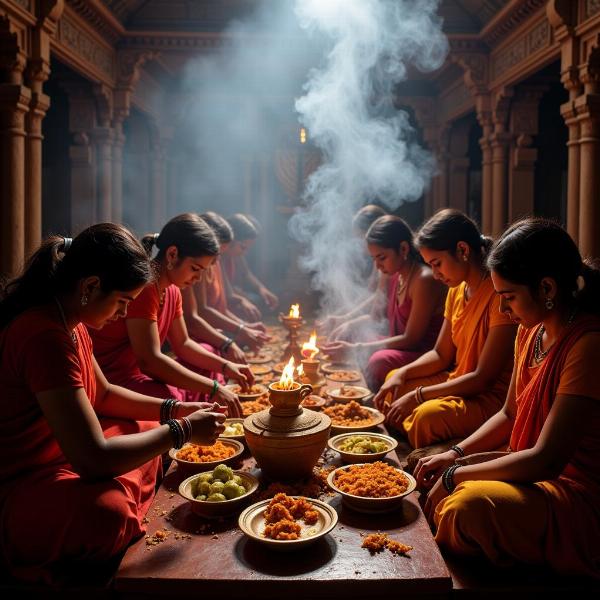Marasim meaning in Hindi encompasses a rich tapestry of meanings related to rituals, customs, traditions, and ceremonies. Understanding this word goes beyond a simple translation, as it delves into the heart of Indian culture and social fabric. This article explores the various facets of “marasim” in Hindi, providing insights into its usage, cultural context, and significance in different aspects of Indian life.
Exploring the Multifaceted Marasim Meaning in Hindi
“Marasim” (مراسم) originates from Arabic and has been adopted into Hindi and Urdu. It often refers to the established practices and formalities associated with specific occasions, both religious and secular. Think of weddings, festivals, funerals, or even official events – these all involve specific “marasim.” The word carries a sense of formality, tradition, and respect for established practices. For instance, the “marasim” of a Hindu wedding involve a series of intricate rituals performed over several days, each with its symbolic meaning.
“Marasim” can also denote customary practices followed in daily life. These might include greetings, hospitality rituals, or even the specific ways certain tasks are carried out within a community. While these might not be as formalized as wedding or funeral ceremonies, they nevertheless contribute to the cultural identity and social cohesion of a group.
Religious and Secular Marasim: A Deeper Dive
The term “marasim” finds significant application in religious contexts. In Islam, for instance, “marasim-e-dafn” refers to funeral rites. Similarly, in Hinduism, various “marasim” are associated with pujas, festivals, and life-cycle events. These religious “marasim” often carry deep spiritual significance and are believed to connect individuals with the divine.
 Religious Marasim in a Temple
Religious Marasim in a Temple
Beyond religion, “marasim” also plays a role in secular contexts. Official ceremonies, state functions, and even social gatherings can have their own set of “marasim.” These might involve specific protocols, dress codes, or forms of address. For instance, the “marasim” of a republic day celebration might include a flag hoisting ceremony, a parade, and speeches by dignitaries.
Marasim and Cultural Identity: An Intrinsic Link
“Marasim” plays a crucial role in shaping and preserving cultural identity. By adhering to established “marasim,” individuals connect with their heritage and reaffirm their belonging to a particular community. These practices serve as a tangible link to the past, transmitting cultural values and beliefs across generations. Understanding the “marasim” of a culture provides valuable insights into its worldview, social structure, and history.
Marasim Meaning in Different Contexts: Examples and Usage
Let’s delve into some specific examples to further illustrate the usage of “marasim”:
- Shaadi ke marasim (शादी के مراسم): Wedding ceremonies
- Janaja ke marasim (जनाज़ा के مراسم): Funeral rites
- Dini marasim (धार्मिक مراسم): Religious ceremonies
- Samajik marasim (सामाजिक مراسم): Social customs
- Rasmi marasim (रस्मी مراسم): Formal ceremonies
Conclusion: Embracing the Richness of Marasim
“Marasim,” in its multifaceted meaning, represents the vibrant tapestry of Indian culture and traditions. From religious ceremonies to everyday customs, “marasim” shapes social interactions, strengthens community bonds, and transmits cultural heritage across generations. Understanding the nuances of “marasim” provides a deeper appreciation for the richness and complexity of Indian society.
FAQs:
- What is the literal translation of “marasim” in Hindi? While a direct translation can be “ceremonies” or “rituals,” it’s important to appreciate its broader cultural connotations.
- Is “marasim” always associated with religion? No, “marasim” can apply to both religious and secular contexts.
- Why is understanding “marasim” important? It provides valuable insights into Indian culture, social dynamics, and traditions.
- Are “marasim” static or do they evolve over time? While rooted in tradition, “marasim” can evolve to reflect changing social norms and values.
- How can I learn more about specific “marasim” in Indian culture? Researching specific events and festivals, or engaging with cultural experts, can offer deeper understanding.
- Is the word “marasim” commonly used in everyday Hindi conversations? Yes, it’s a relatively common word used in various contexts.
- Can “marasim” be used in a negative context? While generally associated with positive cultural practices, it can sometimes be used ironically or to criticize overly formal or outdated practices.
Connecting with Meaning-Hindi.in for Expert Translation Services
Meaning-Hindi.in is your premier destination for accurate and culturally sensitive Hindi translation services. We specialize in various domains, including business, legal, technical, website localization, and academic translation. Our team of expert linguists understands the nuances of the Hindi language and culture, ensuring that your translations are not only accurate but also resonate with your target audience. Whether you need to translate documents related to “shaadi ke marasim” or any other cultural aspect, our team can provide precise and reliable translations. Contact us today at [email protected] or call us at +91 11-4502-7584. Meaning-Hindi.in is committed to bridging language barriers and facilitating cross-cultural communication.